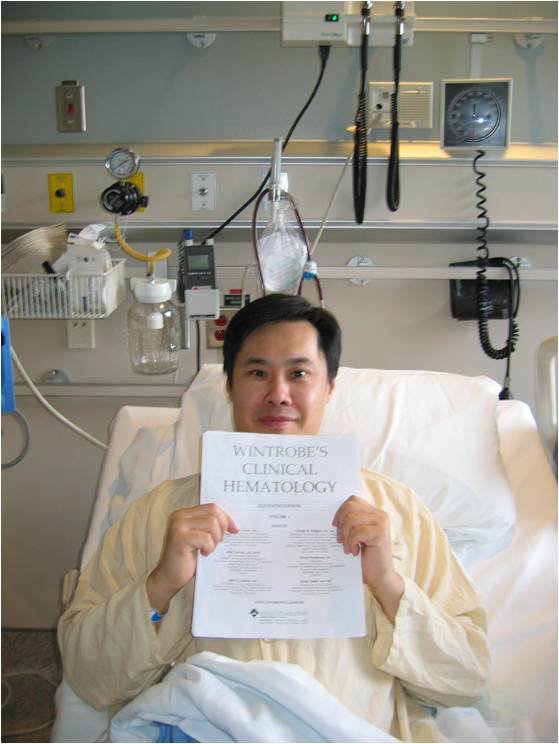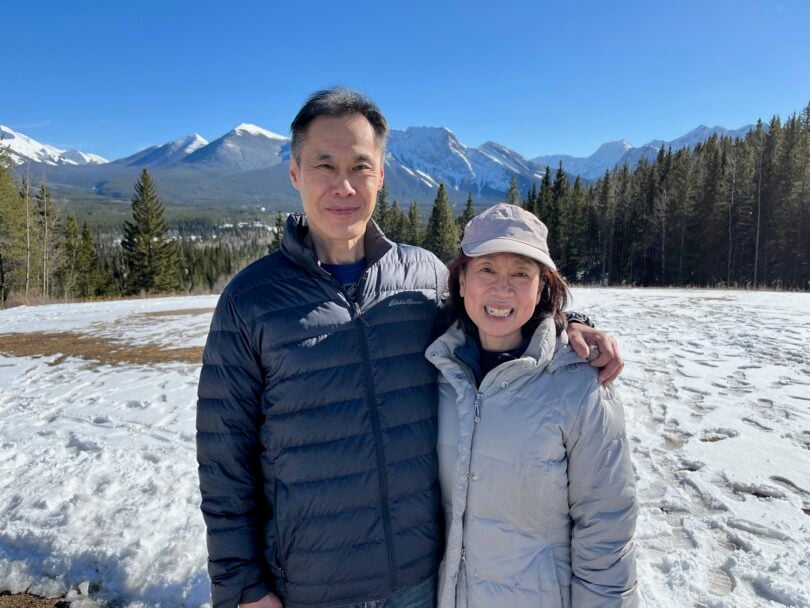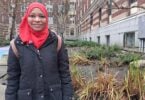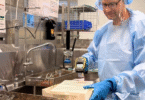Paul Sue is now celebrating 20 years in remission. In honour of Stem Cell Awareness Day, Providence Health Care has partnered with Canadian Blood Services to host drop-in registration events at St. Paul’s Hospital for staff, medical staff, researchers, and volunteers aged 17 to 35 on October 8 and 9.
Back in 2004, Dr. Eileen Wong’s husband, Paul, was more fatigued than usual. At first he noticed feeling short of breath when walking a formerly breezy uphill jaunt from the bus stop to his office. This is unusual, he thought, but brushed it off as being out of shape. Then it was the canker sores in his mouth. They were exceptionally large and incredibly painful. Paul shrugged it off until finally, after attending their son’s school concert, Dr. Wong discovered that the crook of his left arm was saturated with bruises—exactly where he had just been cradling their 18-month-old for an hour.
At age 44, he was diagnosed with aplastic anemia, a rare condition where the bone marrow does not create enough new blood cells—integral for carrying oxygen, fighting infections, and stopping bleeds. He had no family history of the illness and had, up until that point, considered himself in good health.
Dr. Wong—who now practices at Holy Family Hospital and is also the Physician Lead of PHC’s Long-Term Care Quality Improvement—was understandably alarmed. As a medical student, she had followed a case of aplastic anemia. It did not go well.
“I knew everything that could happen: sepsis, uncontrolled bleeding, fungal infection, death—these were my worst fears,” Dr. Wong said. “Standing on the sidelines and watching my loved one going through this process was very difficult, and thinking of the worst outcomes made it even harder.”
Humour as medicine
Dr. Wong and Paul were raising two sons from his previous relationship as well as a then-toddler they had adopted together from China. All three children were under the age of 15 and now sharing a home with a vulnerable, neutropenic (low white blood cell count) father.
As the family adjusted to this new reality, Paul began a regimen of weekly blood transfusions before starting a critical course of immunosuppressive therapy. To cope with undergoing treatments at the hospital, he’d try to combat the somber atmosphere with humour, often joking with the doctors and nurses. As his anti-thymocyte globulin (ATG) infusion ran, he’d send dramatic emails to his friends and family. The nurses have strapped me down! They’re not letting me leave! The hyperbole kept things light with his loved ones and gave him a sense of control.
In reality, Paul was the one preventing himself from leaving. The ATG infusion was a crucial part of his recovery. If this didn’t work, he would need a stem cell donor. In the background of it all, his siblings were tested to see if they could be a transplant match. None of them were.
Above: Paul Sue and Dr. Eileen Wong share their story in a Canadian Blood Services video from 2012.
A diverse registry is essential
A year after his treatment, he fortunately no longer needed immunosuppressants or transfusions. Paul ultimately didn’t need a stem cell donor, but Dr. Wong remained concerned for those who potentially did. Their adopted child, for example, would have to rely entirely on the stem cell registry if they ever needed a transplant—and at the time, only 4 per cent of Canadian registrants were of Chinese descent. Because genetic markers used to match donors are closely tied to ancestry, a diverse registry is essential to improving the odds for patients from underrepresented backgrounds.
In 2011, Dr. Wong took the reins of the late MLA Sindi Ahluwalia Hawkins’ Thanks Mom stem cell drive. Sindi was a former nurse and lawyer who championed for better cancer care and research throughout British Columbia before passing away from acute myeloid leukemia in 2010. Dr. Wong continued the awareness campaign every Mother’s Day until Covid hit. Today, Paul shares his story to inspire others to register, knowing firsthand how critical donor matches can be.
“You may not all see immediate results of your registration, but rest assured down the road someone will be in need—urgently, like in my case,” said Paul.
“You can make a difference. It’s a small thing to do, but it has the potential to be a huge life-changing impact for somebody else.”

The prospect of Paul needing a stem cell transplant also had Dr. Wong reflecting on the Canadian health care system as a whole. She remembers calling to inquire what the cost of a transplant would be in the United States, in case they ran out of other options. At that time, it was estimated to be $350,000 USD.
“We were so grateful that [covered stem cell transplants] existed so we wouldn’t be bankrupted,” Dr. Wong said. “The fact that we have a health care system that helps people regardless of income or background, that is a precious gift as well.”
‘Anyone can make a difference by registering’
As of 2025, Paul has been in remission for 20 years. They’ve raised four children together, and not only that, but they also celebrated their 27th wedding anniversary this past spring.
“I said in our 25th anniversary video that he teases me mercilessly, and that’s what’s endearing about him,” Dr. Wong said. “We really complement each other because I’m very serious.”
Paul agrees. “My wife kept me going. I knew she had my back so that I could take things lightly when I needed to. She made all the difference.”
Dr. Wong adds, “And anyone can make a difference by registering as a potential stem cell donor or by donating blood!”
In honour of Stem Cell Awareness Day, Providence Health Care has partnered with Canadian Blood Services to host drop-in registration events at St. Paul’s Hospital cafeteria for staff, medical staff, researchers, and volunteers aged 17 to 35 on October 8 and 9 from 10AM–2PM.
By Melissa Faulkner





